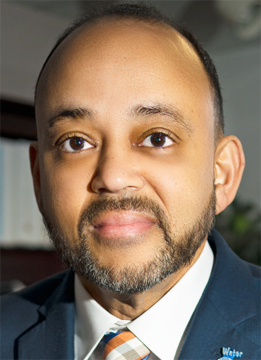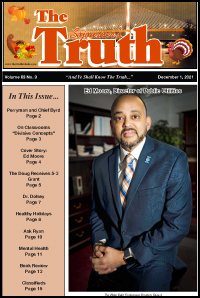By Fletcher Word
Sojourner’s Truth Editor
Edward A. Moore was appointed director of the City of Toledo Department of Public Utilities in 2014 by then-Mayor Mike Bell. It’s a term of service that has seen Moore and the City navigate a path through one water crisis after another – toxic algae blooms that rendered the water undrinkable; a sale of the water treatment plant that threatened to deprive the city residents of approximately $1 billion in value and now, perhaps the worst crisis of all – a lack of water affordability for a large percentage of the city’s population.
According to public utilities expert Roger Colton, who completed a study for Toledo City Council’s Water Quality and Sustainability committee, “for the bottom one-fifth of the [city’s] population by income, the average water burden is 27 percent … of their income for their water bills.”

In response to this crisis, the City has introduced a debt forgiveness program. In order to qualify for the program applicants must live in Toledo, must have past due balances of $200 or more, have an income at or below 200 percent of the federal poverty guidelines or 300 percent if disabled and then stay current on all new charges while enrolled in the program.
The goal for enrollment, says Moore, “is to help everyone we can, if we help one or 10,000 – the numbers have shown that this is something needed in our community.”
Moore is all too familiar with the difficulties such low-income households face. “I grew up in a house without water,” he says. “This is personal to me.”
Moore explains that a good part of his childhood was spent living with his grandmother. “Sometimes we didn’t have water, sometimes we didn’t have electricity, sometimes we didn’t have gas,” he says. “Those are some of the decisions she had to make.”
Moore became Toledo’s Director of Public Utilities in April of 2014. He had previously served as commissioner of Sewer & Drainage, commissioner of Streets, Bridges and Harbor and commissioner of Engineering Services.
A lifelong Toledoan and veteran of the U.S. Navy, Moore has degrees in Managerial Accounting, Engineering Technology and an Executive Master’s Degree in Business Administration.
Moore represents the City on the Toledo Community Water Council, an organization that started meeting in January 2020 to help devise and develop programs related to water accessibility and affordability. The Council helped to create methods to forgive debts related to water charges, storm water charges and sewer charges incurred prior to October 2021. Charges incurred after October 1 will be eligible for an installment payment plan but not debt forgiveness.
There are two parts of the program, explains Moore. For those with debts, incurred before October, of more than $200 and less than $1,000, enrollees must make 12 timely payments over the next year and the prior debt will be forgiven in its entirety.
For those whose debts are over $1,000, enrollees must make timely payments over the next two years and the debt will be forgiven – in its entirety.
“I looked at a lot of different programs and some offered partial relief,” said Moore, clearly proud of the fact that the City is offering such complete assistance to those in need.
There is a good deal more on Moore’s plate than just water debts, however. The American Rescue Plan dollars that the City of Toledo will receive – in excess of $180 million – will enable the city to replace the lead pipes that deliver that water, in both public and private spaces. The ongoing issue of lead pipes, says Moore, is not separate from the issue of poverty.
“There is a natural connectivity,” he says, because the oldest parts of the city – with combined sewer water tied to storm water – are also those sections with the highest poverty rates. “They qualify for poverty rates [and water debt forgiveness] and they qualify for lead replacement service.”
However, says Moore, of the lead pipe issue, “we don’t have a lead problem.” The city’s treatment of such pipes, the program to coat the interiors of lead pipes, has “made our water safe,” he says. “But we want to get ahead of [the issue] and we test every three years.” Nevertheless, the monies from the American Rescue Plan to replace such pipes entirely is a fortuitous occurrence.
In fact, in spite of the numerous water issues that have sprung up during Moore’s watch, he cannot help to remain optimistic about the condition of the area’s water and the future for Toledoans who live on the shores of the Great Lakes, the world’s largest fresh-water reserve by total area and the second largest by total volume – more than one fifth of the world’s surface fresh water.
During his years at the helm of the Department of Public Utilities, $500 million has been spent on improving the condition of the water treatment plant, the ozone system is in very good shape and multiple barriers have been put in place to prevent another algae bloom.
For the person in charge of water, however, there will always be challenges. The sewer plant needs improvement, Moore notes. The Great Lakes are always vulnerable to dangerous invasive species. Such vulnerabilities and improvements mean that inevitably rates will increase for Toledoans.
There will always be something to keep Ed Moore busy.

